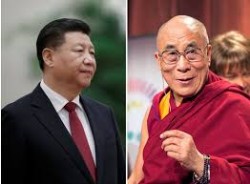Tibetet Segítő Társaság Sambhala Tibet Központ
Tibet Support Association Sambhala Tibet Center
székhely / telephely H-Budapest I. Attila út 123..
(00-36) 70 431 9343 (00-36)70 944 0260 (06-1)782 7721
sambhala@tibet.hu www.tibet.hu tibetpress.info
Facebook/Sambhala Tibet Központ Facebook/Tibett Segítő Társaság
MagnetBank/ 16200010-00110240
IBAN/HU94 16200010 00110240 00000000 SWIFT/HBWEHUHB
(1%) adószám/ 18061347-1-41
nyitva tartás/hétköznap 12.00-20.00 hétvégén előadás függő
» Retro» Tibeti művészet» Interjú» Levelek» Tibet Press» Tibet Press English» Dharma Press» Human Rights» Világ» Kína» Magyar» Ujgur» Belső-Mongólia » KőrösiCsoma» Élettér» Határozatok» Nyilatkozatok» tibeti művészet» lapszemle.hu» thetibetpost.com» eastinfo.hu» rangzen.net» ChoegyalTenzin» tibet.net» phayul.com» DalaiLama.com» vilaghelyzete.blogspot.com» Videók» Linkek» TibetiHírek» Szerkesztőség
Egy neves indiai újságíró könyve feltárja, hogy Xi Jinping egyetért a Dalai Lámával való találkozással
2019. május 15./Phayul.com/TibetPress
Jelenleg csak angolul olvasható. Magyarul később.
eredeti cikk
By Tenzin Dharpo DHARAMSHALA, May 15: If a new book by a veteran Indian Journalist and a TV news anchor is anything to go by, the exiled Tibetan leader His Holiness the Dalai Lama has said that the Chinese President Xi Jinping agreed to meet him in 2014 during his state visit to New Delhi but the meeting did not take place following a “cautious” intervention by New Delhi.
DHARAMSHALA, May 15: If a new book by a veteran Indian Journalist and a TV news anchor is anything to go by, the exiled Tibetan leader His Holiness the Dalai Lama has said that the Chinese President Xi Jinping agreed to meet him in 2014 during his state visit to New Delhi but the meeting did not take place following a “cautious” intervention by New Delhi.
Sonia Singh, the Editorial Director for NDTV news agency in her new book Defining India, through their eyes documents and dissects her interviews with prolific personalities in her 27 years of journalism.
An excerpt from the book on the revelation states the Dalai Lama as saying, “In 2014, when Chinese President Xi Jinping visited Delhi for talks with Prime Minister Modi, I requested a meeting with him. President Xi Jinping agreed, but the Indian government was cautious about the meeting, so it didn't happen.”
The book also laid a theory on what may have caused New Delhi to intervene and ultimately not let the meeting go through. “A meeting between the Dalai Lama and President Xi could have also been used as a propaganda tool by the Chinese to outwit both India and the Dalai Lama, who is seen by some foreign policy strategists as India's trump card against the Chinese. It's not surprising then that the request for the meeting must have sent the ministry of external affairs into a spin leading to a denial of the request,” an excerpt further read.
The aging Tibetan leader who is widely seen as the spearhead of Tibet and the political movement of the Tibetans has become an integral part of the geo-political discourse, particularly when it concerns the two largest powers in Asia: China and India.
The Nobel laureate has maintained that although Tibet is a historically independent nation, he is seeking autonomy under the Chinese framework moving forward. He has advocated dialogue between his representatives and Beijing over the last few decades.
The talks between the two sides have stalled since 2010 after nine rounds of meeting. The two envoys, Lodi G. Gyari and Kelsang Gyaltsen resigned in June 2012 citing lack of genuine conviction to resolve the issue from Beijing. The exile Tibetan government, known officially as the Central Tibetan Administration continues to call out Beijing for dialogue.
